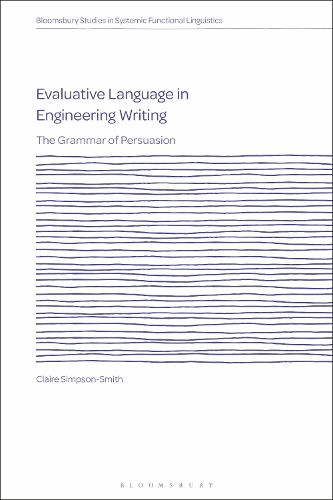Readings Newsletter
Become a Readings Member to make your shopping experience even easier.
Sign in or sign up for free!
You’re not far away from qualifying for FREE standard shipping within Australia
You’ve qualified for FREE standard shipping within Australia
The cart is loading…






This book examines strategic language use in professional engineering written reports, illustrating how writers create a persuasive stance within an objective style. It describes engineering writing through a close analysis of interpersonal language, using Systemic Functional Linguistics (SFL), complemented with quantitative corpus linguistics methods and interpreted through concepts drawn from Legitimation Code Theory (LCT). This description demonstrates how engineering writers have a strong preference for a certain type of evaluative language, with a dominant stance focused on the worthiness of things and processes. It is also demonstrates that engineering writers make strategic choices in their use of interpersonal language towards a certain aim, particularly in documents written to gain approval of a project by a regulatory body. This research is focused on engineering writing in the Australian context, but given the globalised nature of the engineering profession, also has relevance internationally. The creation of an objective stance in writing is also relevant to other disciplines.
$9.00 standard shipping within Australia
FREE standard shipping within Australia for orders over $100.00
Express & International shipping calculated at checkout
Stock availability can be subject to change without notice. We recommend calling the shop or contacting our online team to check availability of low stock items. Please see our Shopping Online page for more details.
This book examines strategic language use in professional engineering written reports, illustrating how writers create a persuasive stance within an objective style. It describes engineering writing through a close analysis of interpersonal language, using Systemic Functional Linguistics (SFL), complemented with quantitative corpus linguistics methods and interpreted through concepts drawn from Legitimation Code Theory (LCT). This description demonstrates how engineering writers have a strong preference for a certain type of evaluative language, with a dominant stance focused on the worthiness of things and processes. It is also demonstrates that engineering writers make strategic choices in their use of interpersonal language towards a certain aim, particularly in documents written to gain approval of a project by a regulatory body. This research is focused on engineering writing in the Australian context, but given the globalised nature of the engineering profession, also has relevance internationally. The creation of an objective stance in writing is also relevant to other disciplines.